- Home
- Jonathan Stroud
The Dagger in the Desk
The Dagger in the Desk Read online
Contents
Cover
About the Book
Title Page
The Dagger in the Desk
A Gallery of Ghosts
Read on for a sneak peek of Lockwood & Co.: The Screaming Staircase
About the Author
Also by Jonathan Stroud
Copyright
About the Book
A thrilling new case for London’s most talented psychic detection agency – from the global bestselling author of the Bartimaeus Sequence.
In London, a mysterious and potentially deadly ghost is stalking the halls of St Simeon’s Academy for Talented Youngsters. It lurks in the shadows, spreading fear and icy cold – and it carries a sharp and very solid dagger . . .
The headmaster wastes no time in enlisting the help of ghost-hunters Anthony Lockwood, Lucy Carlyle and George Cubbins.
Can Lockwood & Co. survive the night and save the day?
The Dagger in the Desk
Jonathan Stroud
The Dagger in the Desk
It was a winter’s morning, the day after the messy conclusion to the Case of the Floating Fingers, and Lockwood, George and I had assembled in the kitchen for a very late breakfast. Rapiers, chains and salt-bombs lay scattered on the table. George’s jacket, peppered with ectoplasm burns, hung steaming on a chair. A severed hand, securely contained in a silver-glass case, sat by the cornflakes, ready for disposal later. This sort of thing is normal in our house, and it didn’t spoil our appetite. We were just helping ourselves to another round of tea and toast when there was a clanging on the bell outside.
‘Could be a client,’ Lockwood said. ‘Go see who it is, Lucy.’
I frowned. ‘Why me?’
‘I’m still in my pyjamas and George’s face is covered in jam.’
They were decent points; I couldn’t argue with them. I answered the door. On the step stood a small, roundish man with a pink face and a dishevelled mop of sandy hair. He wore a brown tweed suit and a wild-eyed expression of deep horror.
‘I-I’m sorry to disturb you, miss,’ he said, ‘but I-I believe I’ve seen a ghost.’
I smiled cheerily. ‘Then that’s our business, sir. Come in.’
If anything, the man’s unease grew once I’d settled him on the sofa with a biscuit and a cup of tea. His fingers shook, his teeth chattered, his eyes darted from side to side as if he expected something to leap from the wall and devour him. When Lockwood (now fully clothed) and George (partially de-jammed) came in, he jumped violently, sloshing tea down the front of his shirt.
Lockwood shook his hand. ‘I’m Anthony Lockwood. These are my associates, George Cubbins and Lucy Carlyle. How can we help you today?’
‘My name,’ the pink-faced man said, ‘is Samuel Whitaker, and I am the headmaster of St Simeon’s Academy for Talented Youngsters, a well-known school in Hammersmith. It is an old school, but much modernized over the years. Only last month, indeed, we opened a new library, and it was then’ – he swallowed audibly – ‘that the incidents began.
‘It was the children who noticed the change first,’ Mr Whitaker went on. ‘Pupils in Class 2A. They complained of an unpleasant odour in the air. Of course, 2A is just along from the boys’ toilets, so I thought nothing of it. But they also spoke of a spreading chill, a feeling of inexplicable dread – and of hearing a faint clinking sound.’
‘What kind of clinking?’ George asked. ‘Manacles? Chains?’
‘I don’t know. I am an adult. I heard nothing.’
‘When do these phenomena occur?’
‘Always late afternoon, as the light starts fading. Anyway, yesterday things got worse. I was teaching Class 2A. Just as the pupils were packing up, complaining again of the cold and the troubling smell, something was thrown into the classroom. It smashed straight through the glass of the door, whizzed through the air, and plunged deep into the side of my desk. A knife, Mr Lockwood! A long thin knife with an antique handle! When I got over my shock, I ran outside, and looked up and down the corridor. Just for a moment I fancied I saw – out of the corner of my eye – a shadow standing by the library door: a hunched and disfigured shape. I turned my head – and the presence was gone. Yet I had the impression that something was watching me; something filled with terrible wickedness and spite . . .’ Mr Whitaker shuddered. ‘That was enough for me! I have closed the school and come to you in the hope that you will help.’
‘We will certainly do our best,’ Lockwood said. ‘One question: where is the knife?’
The headmaster blinked. ‘It was deeply embedded in the desk and I could not pull it free. I left it when we evacuated the classroom. It will still be there.’
Lockwood clicked his tongue. ‘I hope so . . . Well, we will find out tonight. Is Class 2A in one of the original sections of the school?’
‘Yes, it is a hundred years old. You can tell from the wood panelling on the wall.’
‘Is it close to the new library?’
‘Not far. Just along the corridor.’
‘Thank you, Mr Whitaker,’ Lockwood said. ‘That’s fine. We’ll be at St Simeon’s an hour before dusk. You will leave the door open, I hope?’
‘Certainly . . .’ The little man hesitated. ‘But I trust you won’t want me to . . .’
Lockwood grinned. ‘Don’t worry, we’ll look around on our own.’ He stood and held out his hand. ‘Well, goodbye. We’ll report to you first thing tomorrow.’
‘So what do we think?’ I said as we watched our client totter down the path and hurry off up the road. ‘A Poltergeist?’
Lockwood shook his head. ‘Poltergeists chuck things around, but they don’t take bodily form, do they? And Whitaker saw a shadow.’
George had taken off his glasses and was polishing them dubiously. ‘I don’t like it,’ he muttered. ‘I don’t like it at all. This is a ghost strong enough to throw sharp objects about before it’s even dark! We’re going to have to be careful.’
‘Oh, you worry too much, George,’ Lockwood said. ‘It’ll all be fine.’ He stretched his arms and yawned. ‘Now, who wants another piece of toast?’
The day grew late. We worked in our basement office, sorting through our kit. Ghosts hate iron and silver, and they don’t much like salt either, so most of our equipment involves combinations of these. I tested the links on our protective iron chains; George refilled our canisters of salt and iron filings; Lockwood handed us each an explosive magnesium flare. We checked our work-belts, and did a final bit of sword practice in the rapier room. After that, we wolfed down some sandwiches, shouldered our bags and set off for Hammersmith. It was a squally, gloomy afternoon, and the wind blew leaves and litter across the road in little gusts. The ghost-lamps were already on.
St Simeon’s Academy for Talented Youngsters turned out to be a rambling set of unattractive buildings situated not far from the motorway flyover. The main school house, stained dark from years of London smoke, was a mess of steep roofs, gothic turrets, and narrow windows that glinted blackly as we approached. Newer, equally ugly wings in glass and concrete stretched either side.
George considered it glumly. ‘That place is simply packed with ghosts,’ he said. ‘I can just tell.’
‘Nothing we can’t handle,’ Lockwood said. ‘Right, here’s the door.’
A single light burned in the front porch, and the door creaked open to the touch. Lockwood stepped in first; I followed. George came along behind.
We looked around.
We were in a tiled foyer, with kids’ art on the walls, and a receptionist’s desk along one wall. The air had that familiar tang of floor polish, socks and stale dinners that most schools share. Ahead of us a long panelled corridor stretched away, punctuated by heavy doors.
The shadows were lengthening now; the light was almost gone. The end of the corridor could not be seen.
We stood there, using our individual Talents. Lockwood and George looked for ghostly traces. I listened for spectral sounds.
All very quiet. Nothing could be heard. Or almost nothing, because just for a moment I thought I caught a faint metallic rattling . . .
Gone. It wasn’t anywhere close. Not yet.
‘All right,’ Lockwood said. ‘Let’s push on. We’ll go straight to Class 2A.’
George held up his hand. ‘Wait a sec, Lockwood. First rule of investigation: always establish a safe base before going deep into a haunted building. We should rig up a strong iron circle here, so we can retreat inside it if anything goes wrong.’
Lockwood frowned. ‘No point putting iron down here. We’re miles from the ghost. It’s a waste of a chain.’
George glared at him from behind his little spectacles. ‘Dozens of agents get killed every year because they don’t bother with the correct precautions! It won’t take a minute, and it’s better to be safe than sorry.’
‘Well, I think we need to go straight to the heart of things and hunt the enemy out,’ Lockwood said. ‘What do you think, Lucy?’
‘I’m just wondering whether we should pay a visit to this new library,’ I said. ‘According to Whitaker, the hauntings only began when it was built. Maybe the construction work disturbed something – perhaps that’s where we’ll find the ghost.’
Lockwood nodded slowly. ‘That’s not a bad point, Luce,’ he said. ‘We’ll sneak a look in the library on the way to the classroom. Take some readings there. Speaking of which – what’s the temperature now?’
George, who’d been grumbling under his breath because we’d ignored his advice, unclipped his belt thermometer and checked the luminous display. ‘Sixteen degrees.’
‘OK. Keep an eye on it. Let me know if it starts changing.’
A sudden, unexpected fall in temperature is one sure sign of upcoming supernatural activity. Sometimes it’s a hint that saves your life. In the case of the Bay House Horror I saw the temp plunge ten degrees when I walked into that attic bathroom. It gave me just enough time to draw my sword before the Wraith stepped through the tiles.
But sixteen degrees seemed safe enough. Adjusting our bags, keeping our hands close to our belts, we set off up the corridor.
It was clearly an original part of the school, with oak panelling covering the lower half of the plastered walls. Ranks of notice boards and photographs rose almost to the ceiling. There were sports teams, prize winners and whole-school photos, with massed ranks of pupils and teachers staring at the camera. It was too dark to make out the details. To keep our senses sharp, we mostly kept our torches off – flicking them on occasionally to check the signs outside each door.
‘Class 1A, IB . . .’ Lockwood murmured. ‘1C . . . the science lab . . . Where is this library, anyway?’
A sound echoed in the darkness – a deep, harsh creaking, instantly cut off.
I stopped short. ‘Was that your stomach, George?’
He looked at me blankly. ‘Was what my stomach? I didn’t hear anything.’
‘Nor me,’ Lockwood said. ‘What did you get, Lucy?’
That’s my Talent, you see. I hear things other people don’t. ‘A horrid wrenching creak. Sort of like a rusted door hinge, or a coffin lid opening.’
‘What?’ George said. ‘And you thought that was me?’
‘Your belly makes weird sounds when you’re hungry.’
He paused. ‘Fair enough. I suppose it does.’
‘Where was this noise?’ Lockwood asked.
‘Somewhere up ahead, maybe. I don’t know.’
‘Good. So we’re going in the right direction.’
We continued steadily, our boots ringing faintly on the wooden flooring, and soon came to the end of the main corridor. Side passages branched out left and right. Ahead of us was a prominent glazed door, somehow more modern than the ones we’d passed. There was an engraved wooden sign on the wall. Lockwood shone his torch on it.
‘Ernest Potts Memorial Library,’ he read. ‘Here we are, then.’
As he spoke, a cool breeze flowed over us, a stirring of the air. We swung our torches wildly up and down the passages, but saw nothing.
‘Temperature’s down,’ George said. ‘Eleven degrees now.’
‘Rapiers at the ready,’ Lockwood said. He opened the door.
Nothing jumped out at us, which is always nice. The library was large and airy, with pleasant, trendy shelves of light-coloured pine. It smelled new. Rows of neatly ordered books covered the walls. Tall windows looked out over a small, drab playing field. There was a half-moon in the sky over London, lighting the room with a feeble glow.
Wordlessly George opened his bag, took out a length of iron chain, and began laying out a protective circle in the centre of the floor. Lockwood didn’t protest. He looked and I listened for danger. We didn’t get anything.
A small plinth hung on the wall between the central windows. On it was a marble bust of a stern, well-fed, Victorian-looking man sporting an enormous pair of mutton-chop whiskers. I went to take a look.
‘Ernest Potts,’ I said, reading the plaque below it. ‘Headmaster, 1925–1957. He looks a dreadful old grump.’
‘What sideburns!’ Lockwood said, marvelling. ‘You could stuff a cushion with the hair on them. I wonder if—’
‘Hold it!’ I said. ‘I hear something.’
Silence in the library. We listened. We stood dead still.
Out in the corridor, beyond the half-closed door, there came a soft, intermittent chinking sound. Not far off, and coming closer. And with it now: the sound of footsteps, limping footsteps – a firm step, then a drawn-out drag, as if a lame leg were being laboriously swung along the floor . . .
‘Got it,’ Lockwood whispered suddenly. ‘I hear it too. Get inside the chains.’
We stepped into the circle.
‘Temperature’s dropping,’ George muttered. ‘Seven degrees . . . Now six . . .’
We took our rapiers from our belts.
Closer, closer came the horrid dragging footsteps. Closer came the clinking sound.
‘Keys,’ I breathed. ‘It sounds like keys.’
‘Five degrees,’ George said calmly. His breath was pluming in the air.
We stood and faced the door.
The footsteps stopped. Thin threads of ghost-fog came trickling round the side of the door. Cold blistered my skin.
Something struck the door on the outside, making the wood reverberate. It struck the wood again.
‘Lockwood,’ I hissed. ‘What do we do?’
‘We sit tight,’ Lockwood said. ‘It’s loud, it’s scary, but it’s not actually attacking us directly. If it comes into the room, that’s a different matter. Wait and see.’
Even as he spoke, a third colossal bang resounded on the door. Flakes of plaster fell from the ceiling and the floor shuddered. George and I flinched back inside the circle. We raised our rapiers, tensed our muscles, waited –
Waited . . .
Nothing came through.
Silence fell outside the door. A pressure lifted from the room. The little trails of ghost-fog dwindled and were gone.
We each exhaled long and loudly. I hadn’t realized I’d been holding my breath.
‘Temp’s back to ten degrees,’ George reported.
Lockwood nodded. ‘It’s over. For now.’ He stepped out of the circle, strode to the door and flung it open. We emerged into the darkened corridor, shining our torches all around. Straight ahead, and to left and right, the passages stretched away. All was still.
‘Nothing,’ George said.
‘Not quite,’ Lockwood said soberly. ‘Look at this.’ He angled his torch beam at the wall beside the door, shining it on the wooden plate, the one that said Ernest Potts Memorial Library. The sign didn’t look quite as smart as it had before: two great deep gashes had been scored diagonal
ly across the wood, carving through the words. A knife might have done it. Or claws. Or long sharp fingernails. There were lots of possibilities, basically, and none of them too pleasant.
‘Is it just me,’ I said, ‘or is something not very happy about this nice new library?’
George was squinting at the sign through his thick round glasses. ‘Either that or it doesn’t like this Ernest Potts geezer. Look at the way his name’s sliced up.’
I nodded. ‘Maybe it took exception to his ridiculous facial hair. I know I did.’
‘Whatever the reason,’ Lockwood said, ‘I don’t feel that the library is quite at the centre of the haunting. Our readings weren’t strong enough inside. The Source must be somewhere else.’
Oh, did I mention Sources before? Here’s the thing about ghosts, you see. They don’t just float about wherever they like. All of them are tied to a specific thing or place – the spot where they died, or something important to them in life, or (most often) their bodily remains. We call this tethering point ‘the Source’, and that’s what agents look for. Find it and destroy it, or seal it up with silver – and that’s the end of the haunting. Then you can all go home for tea.
‘We’d better check out that classroom now,’ Lockwood was saying. ‘Take a look at this mysterious knife, which— Yes, George? What is it?’
George was jiggling about urgently. Either he was suddenly caught short or he’d had an idea. Or both. Sometimes the two did go together. Whichever, it was best not to ignore him.
‘I might hang on in the library, if that’s all right,’ he said. ‘I want to see if there’s a book about the school’s history, or some old school magazines or something. I’d like to discover a bit more about old headmaster Potts if I can. You never know, it might come in useful.’
This is George’s forte – he finds stuff out. Lockwood nodded. ‘Sure you’ll be OK on your own?’
‘Of course. You don’t need to hold my hand. I can lug anything I find inside the chains and read them in there. I’ll be absolutely safe. See you in a bit.’
George went back into the library. Lockwood and I set off down the left-hand passage. We were once again in an old portion of the school, with walls of panelling and plaster. A number of doors opened on our left and we checked them briefly as we went. The first was a storeroom, filled with mops, vacuum cleaners and stacks of toilet roll. The temperature was chilly here: scarcely seven degrees. The next was little more than a walk-in cupboard, containing paper, pens and other stationery. It too was very cold. The third, the boys’ toilets, was niffy, but much warmer – almost twelve degrees. The fourth –

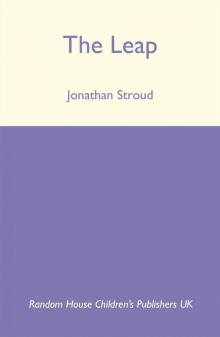 The Leap
The Leap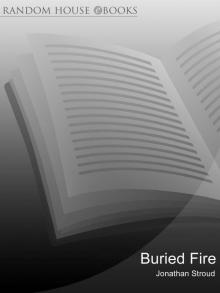 Buried Fire
Buried Fire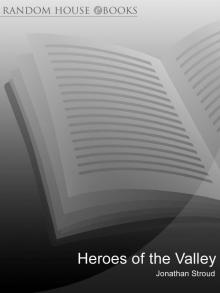 Heroes of the Valley
Heroes of the Valley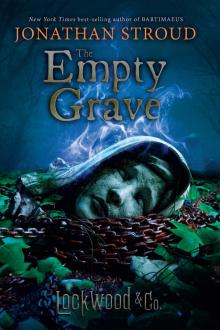 The Empty Grave
The Empty Grave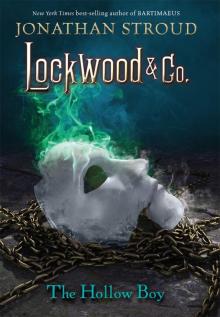 The Hollow Boy
The Hollow Boy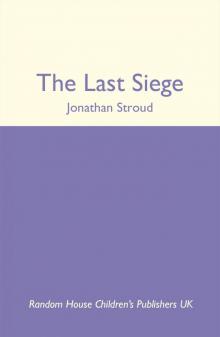 The Last Siege
The Last Siege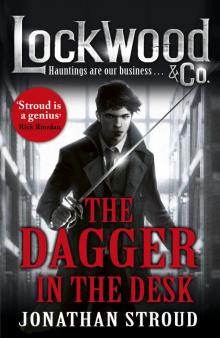 The Dagger in the Desk
The Dagger in the Desk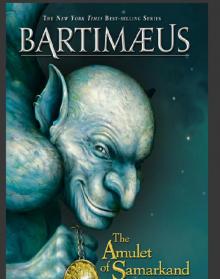 The Amulet of Samarkand
The Amulet of Samarkand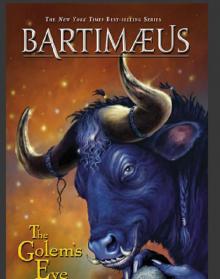 The Golem's Eye
The Golem's Eye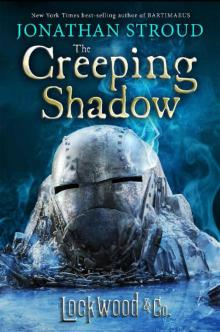 The Screaming Staircase
The Screaming Staircase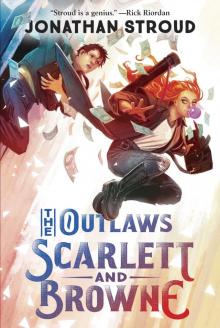 The Outlaws Scarlett and Browne
The Outlaws Scarlett and Browne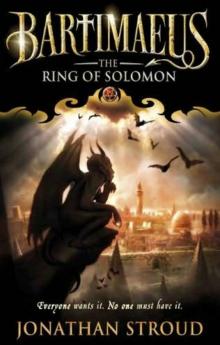 The Ring of Solomon: A Bartimaeus Novel
The Ring of Solomon: A Bartimaeus Novel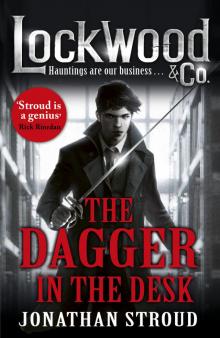 Lockwood & Co
Lockwood & Co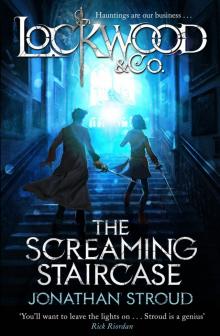 Lockwood & Co: The Screaming Staircase
Lockwood & Co: The Screaming Staircase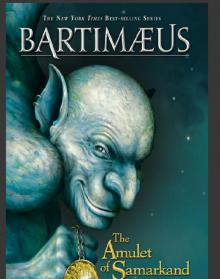 Bartimaeus: The Amulet of Samarkand
Bartimaeus: The Amulet of Samarkand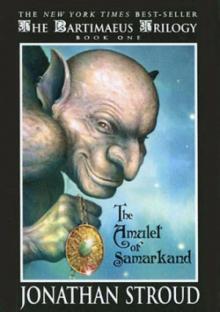 The Amulet of Samarkand tbt-1
The Amulet of Samarkand tbt-1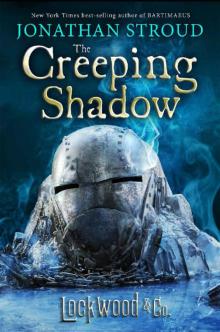 Lockwood & Co.: The Creeping Shadow
Lockwood & Co.: The Creeping Shadow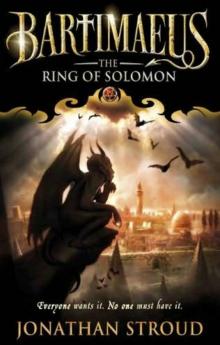 The Ring of Solomon
The Ring of Solomon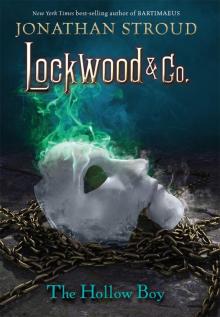 Lockwood & Co. Book Three: The Hollow Boy
Lockwood & Co. Book Three: The Hollow Boy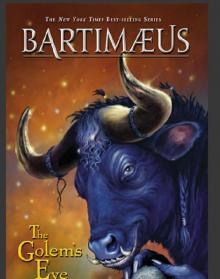 Bartimaeus: The Golem’s Eye
Bartimaeus: The Golem’s Eye